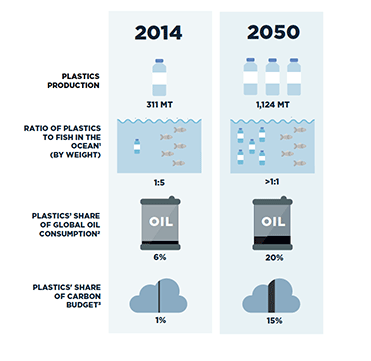
Plastic packaging – small steps in a big problem
Consumers awakening to the problem of plastic packaging, especially its effect on our oceans, is an issue brands are going to have to grapple with. The Ellen MacArthur Foundation estimates that by 2050 there will be more plastic in the sea than fish.
Shocking forecasts like that ought to inspire the packaging industry to go beyond token gestures – Mintel’s Packaging Trends Report 2018 applauds companies such as Ecover which uses plastic recycled from the sea, “but it won’t solve the problem”.
“Using plastic recovered from the sea to create new packaging has been used by ‘eco’ brands such as US-based method and Belgium-based Ecover to draw attention to the issue,” says the report.
“With lobby groups pointing the finger at packaging, brands are right in the firing line. Concerns over safe packaging disposal will increasingly colour consumers’ perceptions of different packaging types and impact shopper purchase decisions. Only by communicating that a brand is working towards a solution will this growing barrier to purchase be overcome.”
A parallel report by Mintel on consumer trends for 2018 applauds the UK ban on rinse-off personal care products containing microbeads and Scotland’s commitment to a plastic bottle return scheme. The UK and Europe can expect more progress like these schemes as consumers demand greater care for the environment and the oceans.
This is an embryonic trend – Greenpeace says that just 14% of the 600 billion bottles produced globally in 2018 will be recycled.
Mintel adds that 72% of UK consumers would be interested in buying products with packaging made wholly or partially from recycled plastic, while 73% would like to see more food/drink that is guaranteed to be sourced from unpolluted waters.
Meanwhile, the Ellen MacArthur Foundation has put forward a global plan called The New Plastics Economy, which “…aims to overcome the limitations of today’s incremental improvements and fragmented initiatives, to create a shared sense of direction, to spark a wave of innovation and to move the plastics value chain into a positive spiral of value capture, stronger economics, and better environmental outcomes.”
More on Mintel’s Packaging Trends Report 2018.
More on the Ellen MacArthur Foundation New Plastics Economy.
The European Commission has announced that by 2030 all plastic packaging in the EU market will be recyclable and the intentional use of micro-plastics will be restricted.
Read more Insights here...